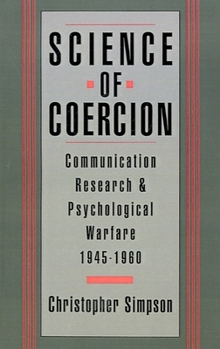Science of Coercion: Communication Research and Psychological Warfare, 1945-1960
Select Format
Select Condition 
Book Overview
Science of Coercion provides the first thorough examination of the role of the CIA, the Pentagon, and other U.S. security agencies in the evolution of modern communication research, a field in the social sciences which crystallized into a distinct discipline in the early 1950s. Government-funded psychological warfare programs underwrote the academic triumph of preconceptions about communication that persist today in communication studies, advertising...
Format:Paperback
Language:English
ISBN:0195102924
ISBN13:9780195102925
Release Date:March 1996
Publisher:Oxford University Press, USA
Length:224 Pages
Weight:0.60 lbs.
Dimensions:0.6" x 5.5" x 8.1"
Customer Reviews
2 ratings
The Coercion of Communications
Published by Thriftbooks.com User , 17 years ago
This book will be of great interest to communications majors and social historians with muckraking tendencies. In an intriguing display of investigative research, Christopher Simpson uncovers the darker side of early communications studies. The field was defined as an academic discipline during and after World War II, and much of the early research that built the foundation of modern communications studies was actually a part of American (and occasionally German) war efforts. Government-funded social scientists built the communications knowledge base while researching and developing the tools of propaganda and psychological warfare, and occasionally disinformation techniques that were used on the American people by their own government. Even some of the highly respected founders of communications were involved, including Harold Lasswell and Wilbur Schramm, and many of their influential studies did not have purely academic motives. Simpson compiles valuable insights into how communications and other social sciences have been co-opted by government for nefarious ends, and some fields may have never gotten off the ground were it not for wartime funding. The only problem with this book is that Simpson occasionally ruminates on the darker philosophical ramifications of these trends, but only rarely, so the deeper insights that can be gained by the reader are often held back by research minutiae and occasionally tiresome historical coverage. [~doomsdayer520~]
Very important and well-documented book
Published by Thriftbooks.com User , 25 years ago
Science of Coercion is an excellent study of how ideas can be shaped by powerful groups. Most revealing is the way in which the researchers themselves allowed this to happen. Many of them were mildly progressive politically, yet they seemed to have no reservations about being involved in military-sponsored projects. Simpson argues that the most important factor in helping the academic researchers to accept the military connection was insulation from the effects of psychological warfare, especially the use of violence.Simpson provides extensive documentation for his argument: there are only 115 pages of text and more than 60 pages of notes. Given that it is strictly about the US experience, it would be nice to have a comparison with experiences in other countries. His study provides a worrying reminder about the extent to which standard ideas in many fields of research may be shaped to serve the interests of powerful interest groups and elite academics.





